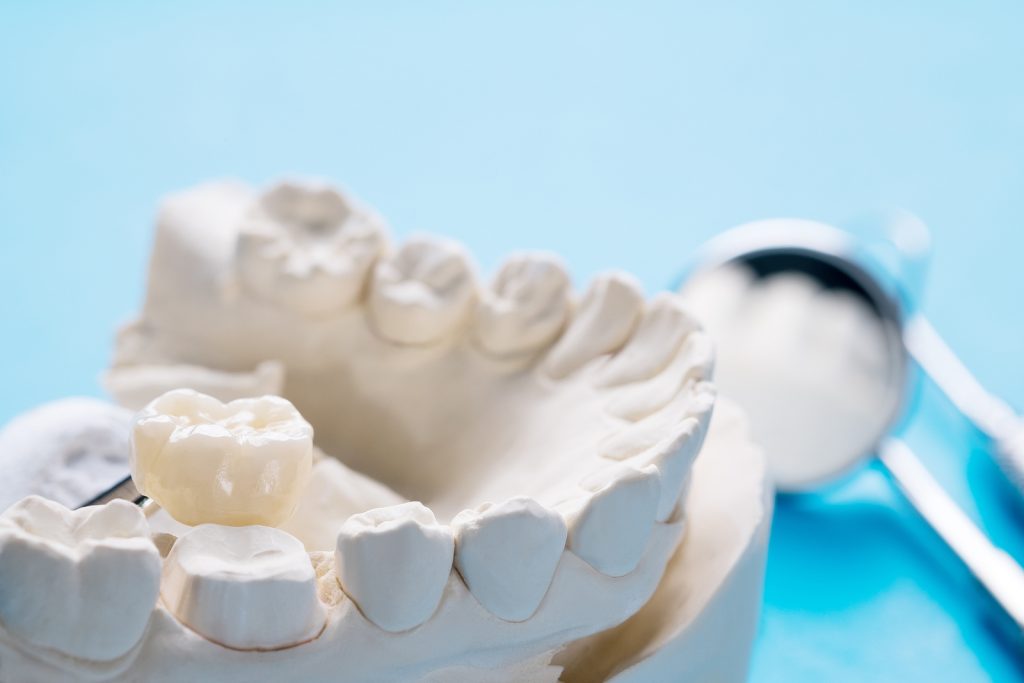While tooth crowns are designed to protect a damaged tooth, they can still cause pain and become infected, just like normal teeth.
However, while tooth crown pain is uncomfortable, it is usually simple to alleviate, either through medication or follow-up treatment from your dentist.

What causes tooth crown pain?
Infection – patients who have dental crown procedures that have also not previously undergone a root canal, means that their tooth still has roots. If a crown is applied incorrectly or is the wrong size, it can put pressure on the nerve and roots of the tooth, which can lead to infection. If a crown is placed over an old filling, this pressure may also result in infection, as the bacteria from the old filling may leak into the nerve, causing pain and discomfort, especially after root canal or crown treatments.
Dry socket – dry socket can occur when an adult tooth is moved and a blood clot forms at the extraction site. This can be extremely painful and may require dental intervention to ensure the site is kept clean and free from bacteria. To learn more about why you should seek immediate dental intervention if you’re suffering from a dry socket after a root canal, read our all you need to know article on dry sockets.
Tooth decay – tooth decay is one of the most common reasons for any tooth-related pain. Decay can be difficult to spot, especially in the back teeth, as not only is it hard to see, but the decay may be located at the border of the tooth and crown. When tooth decay is left untreated, it can affect your tooth roots, which may leave you requiring a root canal.
Fractures – tooth crowns that have experienced an accident, injury or trauma may be at risk of small breaks and hairline fractures. These may not be visible at first but over time, bacteria will enter your mouth and seep into the tiny fissures, which may lead to an infection. Cracked teeth will not heal by themselves, you’ll need to visit your dentist to have a filling.
Sore gums – it’s not uncommon for you to experience gum pain after a tooth crown procedure, but this pain should last no longer than two weeks and be subsiding within that time frame. If pain persists, seek the advice of your dentist.
Improper crown preparation or placement – if your crown has been incorrectly placed or is the wrong size, it will naturally feel uncomfortable. Ill-fitting crowns allow bacteria to enter, which could eventually lead to infection. Additionally, you may have difficulty eating and drinking foods, especially at hot and cold temperatures.
Four ways to help relieve tooth crown pain

Until the cause of your tooth pain is identified, there are temporary pain relief options that may work. For almost all tooth pain problems, OTC (over the counter) pain medication will help to numb the pain temporarily.
Other solutions may include:
- Rinsing your mouth with saltwater
- Anti-inflammatory medication (as directed by a healthcare professional)
- Gently compressing a cold flannel or tea towel to the affected area
- Oil pulling or flossing (the cause of your tooth pain may be food lodged in the affected tooth)
How do I know my tooth crown is infected?
Only your dentist will be able to confirm whether or not your crown is infected, but common signs and symptoms include:
- Jaw pain and throbbing
- Sensitivity to cold foods and drinks
- Nerve pain in affected tooth or teeth
If tooth crown pain persists, visit our clinic
If you have recently undergone treatment or you’re suffering from tooth crown pain for over two weeks with no sign of improvement, it’s strongly advised you seek dental intervention. Our team at Hove Dental Clinic will be able to identify the root of the problem and provide sound, expert advice to ensure that the appropriate course of treatment is applied.
If you are in need of a new tooth crown, we are also able to provide this service.
Book your appointment today and live without discomfort
FAQs
Should my temporary dental crown hurt?
It’s not uncommon for your temporary tooth crown to hurt soon after your procedure. It may be sensitive to hot and cold templates, so be sure to avoid this when eating and drinking, especially for the first week.
Again, however, pain should not last more than two weeks and should b getting better with every day. Temporary crowns that continue to be painful may be loose, poorly fitted or the wrong size for the tooth they’re designed to protect.
How long does a tooth hurt after a crown?
If pain continues for more than two weeks, you should return to your dentist for a follow-up appointment. It may be that the crown has not bonded properly to your tooth, or has become infected due to improper placement. Either way, you should seek the attention of your dentist if pain persists or gets worse after two weeks.
Why does my tooth crown hurt?
There could be a number of reasons why your tooth crown hurts. If you have recently suffered an accident or injury to your mouth, jaw or face, your teeth may have been damaged in the process. When your teeth become cracked, the crown becomes unstable due to the broken foundation. This is one reason why your crown may hurt.
If you have recently undergone a crown replacement and it hurts for up to a week after treatment, your crown may have been placed incorrectly or has not bonded properly to your tooth.
Additionally, those who suffer from bruxism (teeth grinding) may find that this pressure is damaging your crown and therefore the roots of your tooth. If this is the case, you may find that wearing a mouthguard will help ease the pain.
How do I know if my tooth crown is infected?
Again, there are a number of reasons why your crown may be infected. Cavities, fractures and gum recession are common infection signs. Common signs of infection include jaw pain, teeth are sensitive to hot and cold temperatures, root and nerve pain and pain that extends into your head and neck.
Pain that does not get better within two weeks should be inspected by your dentist to ensure the infection does not worsen.





















